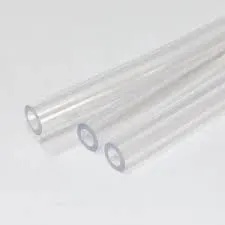Aug . 12, 2024 22:20 Back to list
Exploring Various Applications and Benefits of Large PVC Pipes in Construction and Industrial Projects
The Versatility of Large PVC Pipes An In-Depth Look
Polyvinyl Chloride (PVC) has revolutionized various industries due to its unique characteristics and wide-ranging applications. Among its many forms, large PVC pipes stand out for their incredible versatility and efficiency, serving critical roles in construction, water management, and more. This article delves into the benefits, applications, and considerations regarding the use of large PVC pipes.
Characteristics of Large PVC Pipes
One of the most notable features of large PVC pipes is their durability. Resistant to corrosion, chemical degradation, and weathering, these pipes have a long lifespan, often exceeding 50 years with proper installation and maintenance. Their lightweight nature also simplifies handling and installation processes, making them a preferred choice for many contractors and engineers.
Additionally, large PVC pipes are non-toxic and safe for transporting potable water, adhering to strict health and safety regulations. Their smooth inner surface minimizes friction, which contributes to efficient fluid flow with reduced energy loss, a significant advantage over traditional materials like metal or concrete.
Applications of Large PVC Pipes
1. Water Distribution Systems Large PVC pipes are extensively used in municipal water supply networks. Their resistance to corrosion and scale buildup ensures a continuous supply of clean water. The pipes are available in various diameters, enabling engineers to select the appropriate size for different sections of the distribution system.
2. Sewer and Drainage Systems In wastewater management, large PVC pipes play a vital role. They are capable of handling high volumes of sewage and stormwater, efficiently transporting waste away from residential and commercial areas. Their lightweight nature simplifies installation, and their resistance to chemical corrosion enhances longevity even in harsh environments.
large pvc pipe

3. Irrigation Systems Agriculture benefits significantly from large PVC pipes, which are used in irrigation systems to distribute water evenly across fields. Their durability ensures that they can withstand the pressures associated with high flow rates, and their resistance to UV radiation helps maintain functional integrity over time.
4. Industrial Applications Large PVC pipes find applications in various industrial settings, from chemical processing to manufacturing. Their ability to handle aggressive chemicals makes them ideal for transporting corrosive materials safely, and their flexibility allows for innovative designs tailored to specific industrial needs.
Considerations in Using Large PVC Pipes
While the advantages of large PVC pipes are numerous, it is essential to consider certain factors before their installation. First, the installation must adhere to local regulations and standards to ensure safety and efficiency. Engineers should evaluate the specific conditions of the site, including soil type, weather patterns, and the intended use of the pipes.
Moreover, while large PVC pipes are generally resistant to chemicals, exposure to certain substances can degrade the material over time. It is crucial to conduct thorough material compatibility assessments before selecting PVC for specific applications.
Lastly, proper installation techniques and periodic maintenance will enhance the lifespan of large PVC pipes. Regular inspections can help identify potential issues, ensuring that the systems remain functional and efficient for years to come.
Conclusion
Large PVC pipes are a cornerstone of modern infrastructure, offering a blend of durability, versatility, and efficiency. From municipal water systems to industrial applications, their role in various industries cannot be understated. As technology and materials continue to evolve, large PVC pipes will undoubtedly remain a reliable solution for fluid transportation, contributing to the sustainability and efficiency of countless systems around the world. As we look to the future, the adoption of PVC pipe technology promises to support growing urban populations, advanced agricultural practices, and robust industrial operations, reinforcing its position as an essential component in our daily lives.
-
PVC Grey Sheet for Extraction: Chemical Resistant & Durable
NewsAug.19,2025
-
Durable PVC Pipe Fittings for Plumbing & Irrigation Needs
NewsAug.18,2025
-
HDPE Steel Belt Reinforced Spiral Corrugated Pipe | High Strength
NewsAug.17,2025
-
HDPE Pipe Fittings: Durable, Leak-Proof Solutions
NewsAug.16,2025
-
Premium CPVC Sheet: High-Temp & Chemical Resistant Solutions
NewsAug.15,2025
-
Durable PPR Pipe for Hot & Cold Water Systems - Easy Install
NewsAug.14,2025

